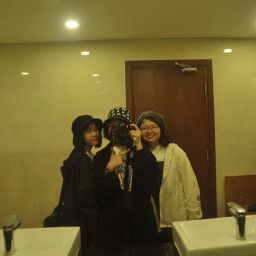I. Choose the odd one out: 1. A. once B. three C. two D. four 2. A. Music B. Science C. Monday D. Maths 3. A. am B. do C. is D. are II. Fill in “to, for, at, on, with” 1. Are you _____ school now? – Yes, I am. 2. Where are you, Ken? – I’m ____ home _________ my brothers. 3. I’m studying my Maths lesson. – Good ________ you. 4. I have English twice a week, _____ Monday and Thursday. 5. It’s nice _____ talk _____ you again. III. Choose the best answer, A or B: 1. Mai _________ three times a week....
Đọc tiếp
I. Choose the odd one out: 1. A. once B. three C. two D. four 2. A. Music B. Science C. Monday D. Maths 3. A. am B. do C. is D. are II. Fill in “to, for, at, on, with” 1. Are you _____ school now? – Yes, I am. 2. Where are you, Ken? – I’m ____ home _________ my brothers. 3. I’m studying my Maths lesson. – Good ________ you. 4. I have English twice a week, _____ Monday and Thursday. 5. It’s nice _____ talk _____ you again. III. Choose the best answer, A or B: 1. Mai _________ three times a week. A. has English B. at school 2. How many lessons __________? A. do you have today B. she has today 3. How often does Nam _______? A. has Vietnamese B. have Vietnamese 4. What’s your __________? A. like subjects B. favorite subjects 5. We have Music ________. A. one time a week B. once a week IV. Complete the following conversation: Peter: _______ you at school now? Mai: Yes, I _____. It’s break _______. Peter: How _______ lessons do you ________ today? Mai: I have _______: Vietnamese, Maths, Art and English. Peter: _______ often do you have English? Mai: _________ a week, on Tuesday and Friday. Peter: ________ your favorite _____________? Mai: It’s Vietnamese. How about you? Peter: I like Maths. subject What’s many am twice time How Are have four V. Look at Ha’s timetable and answer the questions below: Monday Tuesday Wednesday Thursday Friday Questions: 1. What’s the date today? __________________________________________________________ 2. How many lessons does Ha have today? _______________________________________ 3. What subjects does she have today? ___________________________________________ 4. How often does she have English? _____________________________________________ 5. How often does she have IT? ___________________________________________________ 6. How often does she have Science? _____________________________________________ ============================================================= ~~~Lesson 3~~~ I. Mark the sentence stress (‘) on the words. 1. How many lessons do you have today? – I have four. 2. How many students does your class have – It has thirty-six. 3. How many pencils do you have? – I have two. II. Match the questions with the answers: 1. Do you like Vietnamese? a. It’s Maths. 2. How often do you have PE? b. Yes, I am. It’s break time. 3. How many lessons do you have today? c. Not today, but tomorrow. 4. What’s your favorite subject? d. Yes, I do. 5. What subjects do you have today? e. I have four. 6. Are you at school now? f. I have it twice a week. 7. Do you have school today? g. Maths, Art and Science. III. Reorder the words: 1. Maths/ every/ I/ day/ have/ school/ . __________________________________________ 2. it/ times/ She/ a/ has/ week/ three/ . __________________________________________ 3. your/ What’s/ subject/ favorite/ ? ______________________________________________ 4. often/ PE/ does/ How/ have/ Quan/ ? __________________________________________ 5. have/ lessons/ I/ today/ four/ . _________________________________________________ IV. Translate the sentences into English: 1. Tớ có môn Tiếng Viêt 4 ng ̣ ày 1 tuần. _____________________________________________ 2. Hôm nay ban ḥ oc ṃ ấy tiết? ______________________________________________ 3. Môn hoc yêu th ̣ ích của ban l ̣ à môn gì? ___________________________________________ 4. Tuấn hoc Ti ̣ ếng Anh vào thứ tư và thứ sáu. ______________________________________________________________________. 5. Ban ḥ oc môn Khoa h ̣ oc ṃ ấy lần 1 tuần? ____________________________________________________________________. ~~~TEST FOR UNIT 6~~~ Bà i 1: A. Chon t ̣ ừ có phần gach chân đư ̣ ơc ph ̣ át âm khác: 1. A. trip B. still C. twice D. Music 2. A. lesson B. new C. every D. seven 3. A. many B. Maths C. have D. today B. Chon t ̣ ừ có trong âm kh ̣ ác: 4. A. favorite B. every C. Vietnamese D. Physical 5. A. lesson B. Science C. pupil D. tomorrow Bà i 2: Sắp xếp các chữcá i đểđươc t ̣ ừ đúng 6. RVEEY OLSHOC YDA → _____________________________________ 7. OSLNES → _________________ 8. IESNCEC → __________________ 9. NCEO A EWKE → ________________________ 10. CEPXET → _________________ Bà i 3: Chon t ̣ ừ phù hơp đ̣ ểhoàn thành câu: 11. We go on holiday ________ a year, in the summer. twice 12. She goes to school every day, ____________ Saturday and Sunday. favorite 13. During __________ lessons, we sing many good songs. except 14. They go to Art Club _________ a week, on Thursday and Sunday. once 15. My ________________ subject is Science. Music Bà i 4: A. Chon câu tr ̣ ả lờ i phù hơp cho c ̣ ác câu hỏ i ở côt bên ̣ trá i: 16. Are you at school now? a. It’s Vietnamese. 17. How many lessons do you have today? b. Yes, I am. It’s break time. 18. How often do you have Science? c. Yes, I do. I have 3 lessons today. 19. Do you have school today? d. No, I don’t. I like Music. 20. What subjects do you have today? e. I have four. 21. Do you like Art? f. I have it twice a week. 22. What’s your favorite subject? g. Vietnamese, English and Science. B. Đoc ṿ àhoàn thành đoan ḥ ôi tho ̣ ai sau: ̣ Nam: (23) ______ you have school today? Linda: Yes, I do. Nam: How (24) ________ lessons do you have today? Linda: I have (25) _________: Vietnamese, Maths, PE and Science. Nam: What’s your favorite (26) ______________? Linda: It’s Maths. I like numbers. How about you? Nam: I like (27) ________, too. Bà i 5: A. Đoc đo ̣ an văn, ch ̣ on t ̣ ừ phù hơp đi ̣ ền vào chỗtrống: online pretty lessons singing times My name is Quynh. It is Friday today. I am at school now. I have three (28) ____________: Vietnamese, English and Music. I have English three (29) _________ a week. My English teacher is Miss Loan. She is a (30) ___________ and great teacher. English is one of my favorite subjects because I love (31) ______________ English songs. I also like talking with foreign friends (32) ____________. B. Đoc l ̣ ai đo ̣ an văn r ̣ ồi trả lờ i các câu hỏ i sau: 33. Is Quynh at school now? → _____________________________________________________ 34. How many lessons does she have today? → __________________________________ 35. How often does she have English? → _________________________________________ 36. What’s her favorite subject? → _________________________________________________ Bà i 6: Sắp xếp từ thành câu hoàn chinh: ̉ 37. you/ school/ at/ Are/ now/ ? → _______________________________________________ 38. lessons/ How/ you/ do/ today/ many/ have/ ? → __________________________________________________________________ 39. IT/ have/ Do/ today/ you/ ? → __________________________________________________ 40. four/ Vietnamese/ a/ He/ week/ times/ has/ . → ______________________________________________________________ ============================================================== ~~~REVISION UNIT 1 – 6~~~ Bà i 1: A. Chon t ̣ ừ có phần gach chân đư ̣ ơc ph ̣ át âm khác: 1. A. home B. know C. sport D. go 2. A. beach B. sea C. great D. read 3. A. study B. fun C. busy D. Sunday 4. A. pretty B. centre C. went D. else 5. A. twice B. birthday C. seaside D. quiet B. Chon t ̣ ừ có trong âm kh ̣ ác so vớ i các từ còn lai:̣ 6. A. invite B. island C. enjoy D. address 7. A. tomorrow B. countryside C. yesterday D. sandcastle 8. A. party B. present C. tower D. explore 9. A. Science B. study C. today D. visit 10. A. holiday B. Vietnamese C. underground D. library Bà i 2: Hoàn thành ô chữsau, dưa v ̣ ào gơi ̣ ý bên dướ i. v o t a e s o s h i e u r e 11. She goes shopping _____ a week. 12. Our grandparents live in a small _______ in Nam Dinh Province. 13. Last year, we visited Hoi An _______ Town. 14. I _____ some books at the book fair. 15. How many ______ do you have today? 16. He went to Ha Noi by ________. 17. Where were you last _______? Bà i 3: Chon câu tr ̣ ả lờ i phù hơp cho câu h ̣ ỏ i ở côt bên tr ̣ á i: 18. What do you do in the evening? a. She lives in Da Nang City. 19. How did you go to Hue? b. We went to Phu Quoc Island. 20. Did you join the sports festival? c. It’s big and busy. 21. Where does she live? d. We played hide-and-seek. 22. Do you have school today? e. I will swim in the sea. 23. What’s your city like? f. I usually do my homework. 24. How often do you go fishing? g. He has Maths, English and IT 25. Where did you go last summer? h. I went by train. 26. What did you do at the party? i. No, I didn’t. I went to the zoo. 27. What will you do at the beach? k. Yes, I do. 28. What lessons does he have today? l. Once a month. Bà i 4: Mỗi câu sau có 1 lỗi sai, em hãy tim v ̀ àsửa lỗi sai đó: 29. Did he invited you to his birthday party? __________________ 30. They will build sandcastles in the beach. __________________ 31. How did you get there? – I went on underground. __________________ 32. We took a lot of photo at the party. __________________ 33. She often go swimming with her friends at the weekend. __________________ 34. I always have big breakfast before I go to school. __________________ 35. She lives in her grandparents in a small village. __________________ Bà i 5: A. Đoc đo ̣ an văn, đi ̣ ền từ còn thiếu: homework floor will Province times visited with three Primary in My name is Giang. I’m in Class 5B, Dong Da (36) ___________ School. I live with my parents and my sister in Nam Dinh (37) _____________. My address is Flat 11, the third (38) ________ of Nam Dinh Tower. My city is big, crowded but pretty. I go to school from Monday morning to Friday morning. In the afternoon, I usually do my (39) ___________________. Sometimes, I go to the library (40) _______ my friends. In the evening, I go to English Club on Monday, Thursday and Sunday. I have (41) ________ lessons today: Vietnamese, English and PE. My favorite subject is Vietnamese. I have it four (42) _________ a week. Last summer, I went to Ha Noi with my uncle. We (43) ____________ Ho Chi Minh Mausoleum, Hoan Kiem Lake, Dong Xuan Market and Long Bien Bridge. We took a lot of photos. Next summer, my family (44) _______ go to Ha Long Bay. We may explore the caves and swim (45) ______ the sea. We will have a lot of fun





























